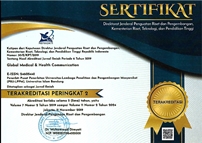Relationship of Illness Perception with Asthma Symptoms Control in Adolescents
Abstract
Asthma has a high prevalence in Indonesia. Good self-management is necessary for therapy and greatly affects the level of asthma control symptoms. The patient's perception plays an important role in the success of asthma therapy, especially among students, because education affects a person's mindset and perception of disease conditions. The purpose was to determine the relationship between illness perception and control of asthma symptoms in adolescents. The method was cross-sectional and was conducted from November 2019 to January 2020. The variables were asthma control and illness perception. This research was conducted on a campus in Surabaya city. Respondents were asked to fill out the Illness Perception Questionnaire (IPQ) and asthma control test (ACT) questionnaire and analyze by calculating each answer point. This study used a chi-square test to analyze the relationship between ACT and Illness perception. This study involved 75 respondents. Of most of the respondents, 58 people have their asthma partially controlled. Most respondents experienced shortness of breath and wheezing symptoms, and most understood that they were related to their asthma. There was a relationship between asthma control scores and illness perception (p>0.05) on the timeline (p=0.03), personal control (p=0.03), and causal representation (p=0.01). Illness perception can affect asthma symptoms. Asthma will be experienced for a long time, and respondents will better adjust their lifestyle and have confidence that it was controlled. Material factors were also considered. If their asthma was controlled, it was hoped not to affect their finances.
Keywords
Full Text:
PDFReferences
Schröders J, Wall S, Hakimi M, Dewi FST, Weinehall L, Nichter M, et al. How is Indonesia coping with its epidemic of chronic noncommunicable diseases? A systematic review with meta-analysis. PLoS One. 2017;12(6):e0179186.
Nguyen VN, Huynh TTH, Chavannes NH. Knowledge on self-management and levels of asthma control among adult patients in Ho Chi Minh city, Vietnam. Int J Gen Med. 2018;11:81–9.
Soler X, Holbrook JT, Gerald LB, Berry CE, Saams J, Henderson RJ, et al. Validity of the asthma control test questionnaire among smoking asthmatics. J Allergy Clin Immunol Pract. 2018;6(1):151–8.
Gemicioğlu B, Mungan D, Bavbek S, Yıldız F, Polatlı M, Naycı S, et al. Validity and reliability of the assessment tool for asthma (ATA) questionnaire: the ATA study. Turk Thorac J. 2020;21(2):93–9.
Alzahrani YA, Becker EA. Asthma control assessment tools. Respir Care. 2016;61(1):106–16.
van Dijk BCP, Svedsater H, Heddini A, Nelsen L, Balradj JS, Alleman C. Relationship between the asthma control test (ACT) and other outcomes: a targeted literature review. BMC Pulm Med. 2020;20(1):79.
Global Initiative for Asthma. Global strategy for asthma management and prevention, 2021. Fontana: Global Initiative for Asthma; 2021 [cited 2022 February 16]. Available at: https://ginasthma.org/wp-content/uploads/2021/05/GINA-Main-Report-2021-V2-WMS.pdf.
Lorensia A, Wahyudi M, Mayzika NA. Effectiveness of fish oil containing omega-3 in improving symptoms and lung function in asthma outpatient in Surabaya, Indonesia. IJPQA. 2018;9(3):260–6.
Papi A, Blasi F, Canonica GW, Morandi L, Richeldi L, Rossi A. Treatment strategies for asthma: reshaping the concept of asthma management. Allergy Asthma Clin Immunol. 2020;16:75.
Wang J, Yang Z, Zheng Y, Peng Y, Wang Q, Xia H, et al. Effects of illness perceptions on health-related quality of life in patients with rheumatoid arthritis in China. Health Qual Life Outcomes. 2021;19(1):126.
Sawyer AT, Harris SL, Koenig HG. Illness perception and high readmission health outcomes. Health Psychol Open. 2019;6(1):2055102919844504.
Lorensia A, Suryadinata RV, Istiqomah NL, Diputra INY. Aktivitas fisik dan risiko PPOK pada pengemudi becak di Surabaya. JSK. 2021;3(5):706–14.
Lorensia A, Wahyudi M, Yudiarso A, Kurnia SED. Effect of illness perception on improving asthma symptoms with omega-3 fish oil therapy: pre-post design. JAPS. 2020;10(6):62–71.
Lorensia A, Suryadinata RV, Ratnasari R. Gambaran persepsi penyakit terhadap kesehatan fungsi paru pada pasien asma di Surabaya. IJPH. 2019;14(2):263–71.
Indrayana S, Fang SY. Validitas dan reliabilitas the brief illness perception questionnaire versi bahasa Indonesia pada pasien diabetes mellitus. Dinamika Kesehat. 2019;10(1):361–8.
Trivedi M, Denton E. Asthma in children and adults—what are the differences and what can they tell us about asthma? Front Pediatr. 2019;7:256.
LoMauro A, Aliverti A. Sex differences in respiratory function. Breathe (Sheff). 2018;14(2):131–40.
Quirce S, Heffler E, Nenasheva N, Demoly P, Menzies-Gow A, Moreira-Jorge A, et al. Revisiting late-onset asthma: clinical characteristics and association with allergy. J Asthma Allergy. 2020;13:743–52.
Schoettler N, Rodríguez E, Weidinger S, Ober C. Advances in asthma and allergic disease genetics: is bigger always better? J Allergy Clin Immunol. 2019;144(6):1495–506.
Murrison LB, Brandt EB, Myers JB, Hershey GKK. Environmental exposures and mechanisms in allergy and asthma development. J Clin Invest. 2019;129(4):1504–15.
Kaplan A, Mitchell PD, Cave AJ, Gagnon R, Foran V, Ellis AK. Effective asthma management: is it time to let the AIR out of SABA? J Clin Med. 2020;9(4):921.
Jahedi L, Downie SR, Saini B, Chan HK, Bosnic-Anticevich S. Inhaler technique in asthma: how does it relate to patients' preferences and attitudes toward their inhalers? J Aerosol Med Pulm Drug Deliv. 2017;30(1):42–52.
Tashiro H, Shore SA. Obesity and severe asthma. Allergol Int. 2019;68(2):135–42.
Landeo-Gutierrez J, Celedón JC. Chronic stress and asthma in adolescents. Ann Allergy Asthma Immunol. 2020;125(4):393–8.
Tiotiu A, Ioan I, Wirth N, Romero-Fernandez R, González-Barcala FJ. The impact of tobacco smoking on adult asthma outcomes. Int J Environ Res Public Health. 2021;18(3):992.
DOI: https://doi.org/10.29313/gmhc.v11i2.9688
pISSN 2301-9123 | eISSN 2460-5441
Visitor since 19 October 2016:
Global Medical and Health Communication is licensed under a Creative Commons Attribution-NonCommercial-ShareAlike 4.0 International License.






























.png)
_(1).png)
_(1).jpg)
